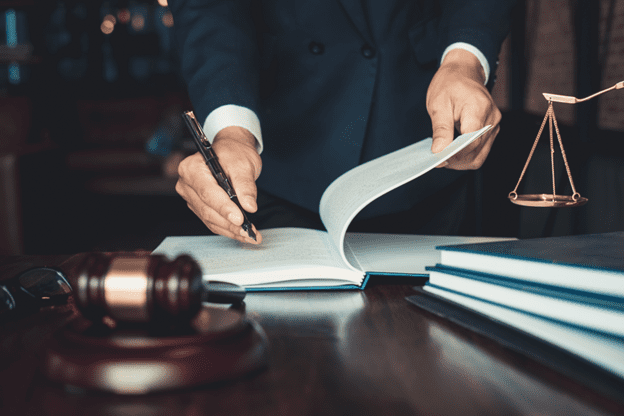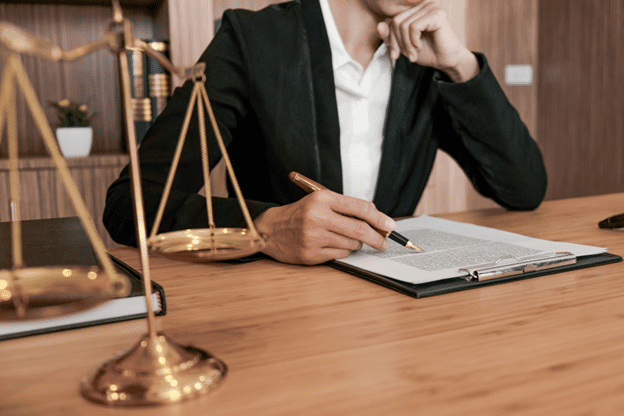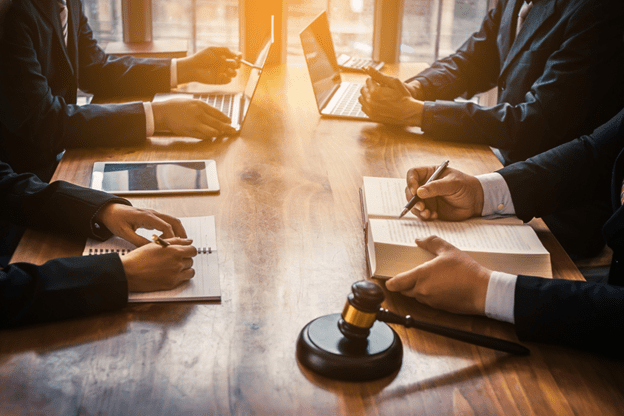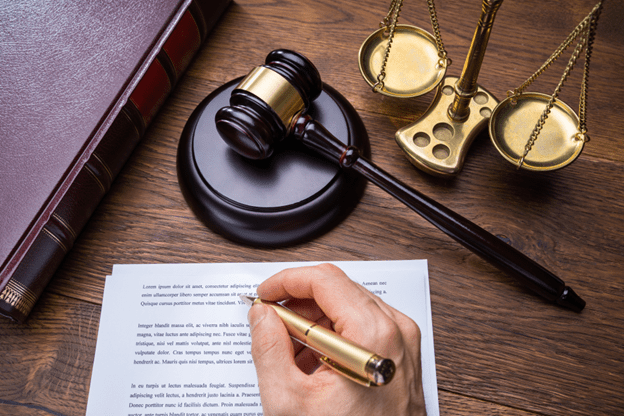Legal Audio Transcription: An Expert Guide (2024)
Learn about legal audio transcription types, use cases, and benefits. Become an expert on all things legal audio transcription.

You’re juggling depositions, hearings, and client meetings—each packed with critical details that could make or break your case. But instead of focusing on strategy, you’re stuck replaying audio, searching for that one key statement buried in hours of recordings.
Frustrating, right?
You need legal audio transcription. Word-for-word transcripts will help you find exactly what you need when you need it. No more wasted hours. No more missed details.
Whether you’re tackling a high-stakes trial, preparing for an appeal, or documenting crucial evidence, legal transcription can save time, reduce stress, and keep your practice running smoothly. Ready to work smarter, not harder?
Legal audio transcription is the process of converting spoken words and sounds to written text. It isn’t the same as court reporting, which happens in real-time during a court proceeding.
Legal transcription converts pre-recorded audio or video into a written format. Transcriptionists use tools like a foot pedal to play, pause, and rewind recordings. They deliver highly accurate, word-for-word transcripts that capture every trial detail after the fact.
Why is Legal Audio Transcription Important?
Almost all depositions and legal proceedings use audio or visual recordings. Why? They allow the original testimony to be captured in its purest form and show the context and body language of a person giving testimony.
However, audio and video recordings can’t be submitted alone. They must be accompanied by a written transcript at trial. This transcript provides conclusive guidance on difficult-to-understand accents, mumbled words, and even unclear language.
Visual or audio evidence has to have an accompanying transcript or it cannot be used as evidence.
How is Legal Audio Transcription Used?

Legal transcription helps legal teams save time, stay organized, and crush their deadlines. Here’s a closer look at all the ways a legal transcription can be used.
Transcriptions provide indexed and searchable text files.
Spending hours scrolling through hours of audio, hunting for one crucial quote—no thanks. Transcripts are like having a CTRL+F for your entire case. It’s easier than ever to find a key witness statement or a sly remark from opposing counsel.
It becomes easier to share case details.
Trying to get a whole team on the same page can feel like herding cats. Transcriptions fix that by giving everyone a clear, detailed record of what’s happening. A good transcript minimizes confusion (and email chains).
Changing counsel is easier with transcription.
Changing counsel mid-case can be overwhelming. But transcriptions make it a lot easier by handing over a written record of everything important—depositions, hearings, you name it. It’s like a cheat sheet for the new attorney to jump right in without missing a beat.
Transcriptions serve as a foundation for impeachments, appeals, and retrials.
Need to prove a procedural error? Catch a witness in a lie? Prepare for a retrial? Transcriptions are your MVP. They provide an exact, word-for-word account of what went down, giving you the ammo you need to make your case.
Legal professionals can focus on strategic work (instead of transcribing hours of audio).
Let’s be real—no one went to law school to spend hours scrubbing through recordings. Transcriptions free up your time to focus on the big stuff: building a killer strategy, analyzing evidence, or impressing the judge with your airtight arguments.
Transcriptions help build case files for future research.
Transcriptions aren’t just useful now—they’ll be useful years later. They’re perfect for academic research, shaping future legal strategies, or pulling out precedent years down the line.
10 Types of Legal Audio Transcription

Legal transcription falls into several categories. Each type requires a specific template, format, familiarity with terminology, and other stylistic considerations. Skilled legal transcriptionists will assess the scope of what is needed at the start of a project.
#1 – Depositions
Depositions are recorded interviews conducted under oath, often outside the courtroom. Transcriptions of depositions allow legal teams to reference witness testimonies during trial preparation or cross-examinations. They help spot inconsistencies and build airtight arguments.
#2 – Interrogations
Interrogations involve questioning witnesses, suspects, or involved parties to gather evidence. Transcribing these sessions creates an accurate record of what was said, helping legal teams analyze responses, verify facts, and prepare for court.
#3 – Court Proceedings
Every word spoken in a courtroom—motions, objections, rulings—is transcribed to create an official record. These transcripts are essential for appeals so that all procedural details and statements are preserved for future reference or challenges.
#4 – Hearings
Hearings are formal legal proceedings held to review evidence, make decisions, or resolve disputes. Transcribing hearings creates an official written record of the discussions, rulings, and testimonies presented.
#5 – Arbitrations
Arbitrations are private proceedings where a neutral party resolves disputes. Transcriptions of these sessions document the arguments, decisions, and agreements made, providing a clear record if any disputes arise later.
#6 – Wiretaps and Surveillance
Wiretaps and surveillance recordings capture conversations under legal authorization. Transcriptions of these recordings often turn complex or muffled audio into readable evidence that can be used in investigations and court proceedings.
#7 – Emergency Calls
911 calls and other emergency communications are often the first documentation of a legal case. Transcribing these calls provides a timeline and critical details about the events unfolding, which can be key evidence in criminal cases or lawsuits.
#8 – Formal Meetings
Formal meetings in the legal or corporate world often involve critical discussions and decisions. Transcriptions clearly reference future actions, compliance, or legal obligations.
#9 – Medical / Legal
Medico / legal transcriptions involve recording and documenting medical evidence, such as expert witness statements, autopsy reports, or medical histories. These transcripts are vital for cases involving malpractice, personal injury, or insurance disputes.
#10 – Legal Dictations
Lawyers often dictate notes, briefs, or letters into recording devices. Transcribing these dictations streamlines the workflow and preserves their ideas and instructions as actionable documents for clients or court filings.
The Benefits of Transcribing Legal Audio
Transcribing legal audio isn’t just a time-saver—it’s a smart investment that delivers measurable returns. Here’s how it transforms the way legal professionals work.
1. Supports Appeals and Evidence Presentations
Transcription is a powerful tool for preserving details that might be crucial during appeals or evidence reviews. A clear, written record strengthens the presentation of audio evidence in court and demonstrates professionalism to judges, clients, and opposing counsel.
2. Accurate Records
Legal transcription ensures precise, word-for-word documentation, minimizing the risk of misinterpretation. When every detail matters, having an exact written record provides clarity and helps avoid disputes.
3. Saves Time
Instead of replaying lengthy recordings to find key information, transcripts allow quick keyword searches. This efficiency frees up time for more critical tasks, like case preparation or client meetings.
4. Facilitates Collaboration
Written transcripts are easy to share across legal teams, ensuring everyone stays aligned. Whether it’s strategizing with colleagues or sharing documents with clients, transcripts streamline communication and collaboration.
5. Improves Accessibility
Transcripts make legal content available to those who might struggle with audio, such as individuals with hearing impairments or tight schedules. This inclusivity ensures everyone can engage with the material effortlessly.

Precision, speed, and confidentiality are essential in the legal field. Legal professionals have long turned to SpeakWrite for high-quality, gold-standard legal transcripts. Here’s why they’re the best in the business.
Expert transcriptionists who get legal jargon.
SpeakWrite doesn’t just hire anyone to handle your legal documents. Their transcriptionists have at least a year of experience working in law offices, which means they know the difference between “tort” and “torte.” Your transcripts are in skilled hands, ensuring they’re accurate, well-formatted, and court-ready.
Lightning-fast turnaround times.
Need a transcript in a hurry? SpeakWrite delivers in about three hours. Whether it’s for a last-minute filing or prepping for tomorrow’s deposition, their speed ensures you’re always ahead of the game.
Affordable and flexible for any law firm.
Keeping in-house staff for transcription can strain your budget, especially when workloads fluctuate. SpeakWrite gives you access to a network of transcription pros 24/7—no hiring, overtime, or hassle. It’s like having an on-call transcription team without the overhead.
If you use Clio to manage your practice, SpeakWrite is your dream partner. Record dictations directly in Clio, send them for transcription and get the completed document delivered to the case file in Clio Manage. It’s smooth and efficient and saves you from jumping between platforms.
Security you can always rely on.
When you’re dealing with sensitive client information, security isn’t just important—it’s everything. SpeakWrite uses multi-layered security, including two-factor authentication and thoroughly vetted transcriptionists, so your confidential data stays exactly that: confidential.
SpeakWrite makes legal transcription fast, accurate, and effortless. Follow these steps to create your next transcript like a pro:
Step #1: Sign up for a SpeakWrite account.
Visit SpeakWrite’s website and create an account. This will give you access to their platform and tools, including mobile and desktop apps. Install the free SpeakWrite app on your mobile device or desktop. It’s your one-stop solution for uploading audio files and managing your transcriptions on the go.
Step #2: Record and upload your audio.
Capture your audio using the app or any recording device. If you’ve already recorded the audio, upload the file directly to SpeakWrite. They support MP3, WAV, and other common formats.
Provide specifics such as speaker names, any special formatting requirements, and background context. This will make sure that the transcriptionist understands the nuances of your recording.
Step #3: Submit the file for transcription.
Click “Submit” on the app or website, and your audio file is off to SpeakWrite’s team of professional transcriptionists, who’ll get to work immediately.
Step #4: Review your transcription.
When your transcript is ready, you’ll receive a notification. Review it to ensure it meets your expectations—SpeakWrite’s 99% accuracy guarantee means it should be flawless. You can edit directly in the SpeakWrite app or desktop tool if you need to tweak anything.
You can save your polished transcript to your device or cloud storage or share it directly with your team from the SpeakWrite platform.
Step #5: Put your transcript to work.
You can use your transcript for research, archiving, presentations, or court proceedings. With SpeakWrite, you’ve got a professional-grade document ready to make an impact.

In a high-stakes legal scenario, a law firm faced a critical motion to dismiss in federal court, with less than 18 hours to respond. The urgency was compounded by the departure of an associate who had left the motion unaddressed, leaving the remaining team scrambling.
Attorney Hugh C. Wood stepped in, working through the night to craft a comprehensive response. He dictated his arguments and uploaded the recordings to SpeakWrite in the early morning hours.
Within a few hours, SpeakWrite returned precise transcriptions, enabling the team to assemble and file a robust response by the afternoon deadline. This swift action preserved the case, resulting in a $750,000 settlement.
Without the rapid and accurate transcription services provided by SpeakWrite, meeting the critical deadline would have been nearly impossible, potentially leading to the case’s dismissal.
Legal Audio Transcription: Frequently Asked Questions
How much does legal transcription cost?
The cost of legal transcription typically ranges from $1 to $3 per minute of audio for professional services, depending on factors like turnaround time, complexity, and additional requirements such as speaker identification or timestamps.
Is legal transcription still in demand?
Yes, legal transcription is still in high demand. With the growing need for accurate legal documentation, especially for court proceedings, depositions, and client meetings, transcription services remain critical for law firms, government agencies, and legal professionals.
How do you become a legal transcriptionist?
To become a legal transcriptionist, you typically need training in legal terminology, excellent typing skills, and attention to detail. Many pursue certification programs to boost their qualifications. You’ll also need transcription tools like foot pedals, audio enhancement software, and word processors to handle the workload effectively.
Your team deserves precious time so you can all focus on what matters most—your clients. You deserve precise, court-ready transcriptions delivered when needed—fast, secure, and hassle-free.
SpeakWrite is a partner who understands the high-stakes world of law. Their expert transcriptionists specialize in legal work and guarantee 99% accuracy, even with the most complex jargon.
With turnaround times as quick as three hours, you can focus on winning cases instead of worrying about paperwork. Plus, SpeakWrite integrates seamlessly with Clio, so it’s easier than ever to manage, submit, and retrieve your transcriptions directly.
Why settle for anything less than excellence? Let SpeakWrite handle your legal transcription needs so you can focus on what you do best—delivering justice. Try SpeakWrite for free today!
